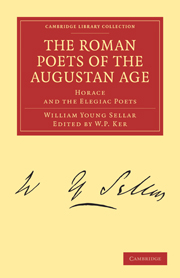CHAPTER IV - THE ART AND GENIUS OF PROPERTIUS
Published online by Cambridge University Press: 07 September 2011
Summary
Propertius, in the opening poem of the third book, claims to be ‘a high priest from a pure source of poetry, who first bore the sacred symbols of Italy through the movements of the Greek dance.’ In language less strained, he claims to be the first interpreter of the passions of Italy in the forms of Greek art. In making this boast he seems to forget the claims of Calvus and Catullus, of Varro and Gallus, which he had just conceded in the last poem of the second book. He is here consciously or unconsciously repeating the claim expressed by Horace in simpler language—
carmina non prius
Audita Musarum sacerdos
Virginibus puerisque canto—
as in the following poem he recalls more than one thought of the ‘Exegi monumentum.’ But the claim made by Horace is better warranted than that of Propertius. Not only had those four poets celebrated their loves in Greek forms and metres, but the contemporary poet Tibullus had at least an equal claim with Propertius to have brought the elegy to perfection. The words of Propertius, taken along with his claim to be the Roman Callimachus, and with the two opening lines of this poem—
Callimachi Manes et Coi sacra Philetae,
In vestrum, quaeso, me sinite ire nemus—
are to be interpreted as meaning that he was the first Roman poet who reproduced the art of Alexandria in Latin literature.
- Type
- Chapter
- Information
- The Roman Poets of the Augustan AgeHorace and the Elegiac Poets, pp. 293 - 323Publisher: Cambridge University PressPrint publication year: 2010First published in: 1892



